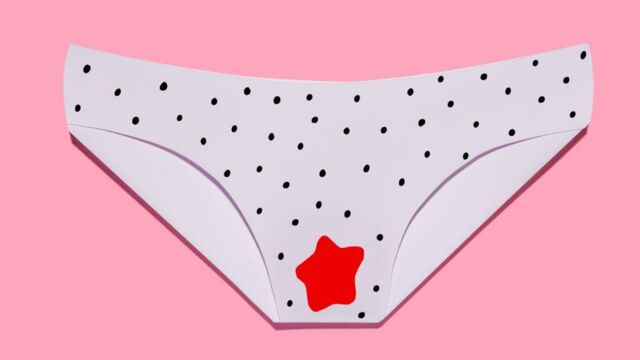I have a distinct memory from the fourth grade, where one of my classmates—the first person in our grade—got her period one day. I recall how secretive the teacher was with her as the two scrambled to deal with the situation without alerting anyone in the class; my teacher escorted her to the bathroom, gave her a change of clothes, and called the girl’s mom to pick her up.
Discover our latest podcast
I didn’t know what my classmate was experiencing, and I didn’t actually figure it out until after school when I helped clean up the classroom. While putting her chair up, I noticed a bloodstain in the middle of the seat and was able to put two and two together. Instead of sympathising with her, all I remember thinking was 'I’m glad this didn’t happen to me.'
When it comes to menstruation, this type of negative thinking and instinct to shame is far too common, and period positivity exists to combat it.

What is period positivity?
As with many other things, people are made to feel shame and guilt for having a period. Menstruation, society believes, is a private matter, and is deeply stigmatised when spoken about in public. Period positivity is all about advocating for the destigmatisation of periods and reeducation on menstrual literacy; periods have been shrouded in secrecy, misinformation, and fear for so long, and it’s time to finally end the cycle.
Period positivity is used to directly combat period poverty—an umbrella term used to describe any type of inequities related to menstruation. This can include people’s access to sanitary products and hygienic spaces to use them in, late diagnoses of reproductive health issues, or, on the more social side, ostracisation from peers.
History of period positivity
Menstrual periods are as old as humankind itself, but they have been left out of historical conversations for far too long due to the shame associated with periods.
It wasn’t until 1831 when menstruation was linked with ovulation—prior to that, people believed it was to rid the body of poisoned blood. Forty years later, the first advertisements for menstrual products began to appear in print media. WWI provided some revolutionary developments in period hygiene, like sanitary napkins and the modern-day tampon, which birthed Tampax, one of the most popular tampon brands worldwide. Advertisements for brands like Tampax played into the humiliation people feel while on their periods, often using copy like 'free from embarrassment' or 'why was I born a woman?'
In 1946, Walt Disney produced The Story of Menstruation for public American schools. In it, there is no mention of sexuality or reproduction. It's only in 1972 that menstrual products are no longer banned from television and radio advertisements.
The ‘70s, being a time of revolution and freedom, had a huge impact on periods and period positivity. Gloria Steinem wrote the essay If Men Could Menstruate: A Political Fantasy positing that if men had periods, it would be viewed as a 'boast-worthy, masculine event' and hygienic products would be federally provided to everyone. 'Our Bodies, Ourselves,' was also released, which shared information for women about taboo health topics, including menstruation.

Where are we now?
While we’ve come a long way from being censored and shamed into silence, there’s still work to be done. In 2008, when Hillary Clinton first ran for president, her period was a frequent source of conflict for political commentators — some even going so far to say that having a female president would be disastrous due to 'the PMS and mood swings.'
Perhaps this type of rhetoric is responsible for the recent uptick in period-centric activism—organisations like Period Positive and PERIOD were created to combat period povertythrough education and distribution services. Movements like 'free bleeding,' which encourages people to menstruate without the use of sanitary products, have been really popular in the past few years. Tampons, pads, and menstrual cup companies are turning away from age-old marketing techniques that push embarrassment onto people, and are now more focused on being frank in how they portray periods.
Key figures
It’s not surprising that a lot of the spearheading individuals in this movement are young—Nadya Okamoto founded PERIOD when she was just 16 years old, and now it’s a nationally-recognised organisation that makes it possible for anybody to start a chapter in their local area.
Many people in the art world have also started spotlighting periods in rebellious, creative ways. Rupi Kaur, the renowned poet, broke the Internet in 2015 when her free-bleeding photograph was taken down twice by Instagram; the incident caused controversy because the photo showed a fully-clothed woman with a bloodstain on her pants, which does not go against any of the community’s guidelines. Other artists, like Jen Lewis, have created artwork out of their menstrual blood in order to reframe it as 'natural' instead of 'disgusting.'
How to help:
- Don’t be shy! Let go of that shame and secrecy you have when it comes to your period. 'Period' isn’t a bad word, and neither is 'tampon' and 'pad.' Open up your dialogue, stop hiding your sanitary products, and normalise talking about it.
- Periods aren’t just for women. Be inclusive in your dialogue. A lot of stereotypes about periods reinforce misogynistic and transphobic beliefs, and one way to combat this is to start with yourself. Instead of saying 'women' when talking about menstruation, try saying 'people' or 'people who menstruate.'
Don’t project onto others. Some people are in different stages of 'period positivity' and that’s completely normal. If you still feel shame about your period, there’s no need to force someone else to feel shame about theirs. If you’re a strong advocate for free-bleeding, there’s no need to demand others free-bleed, as well. This movement looks different for all of us!















